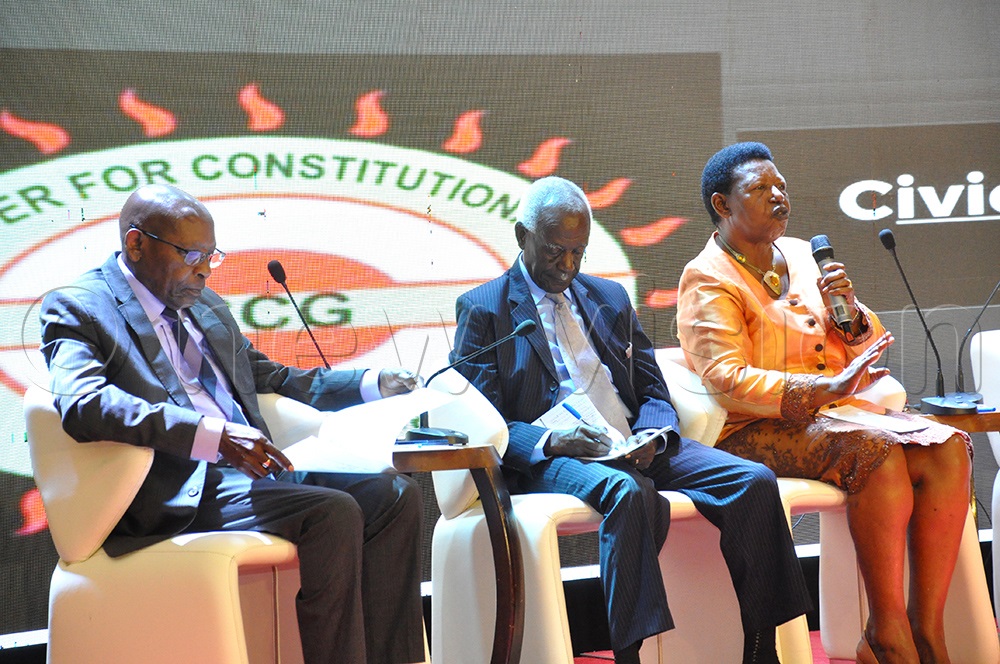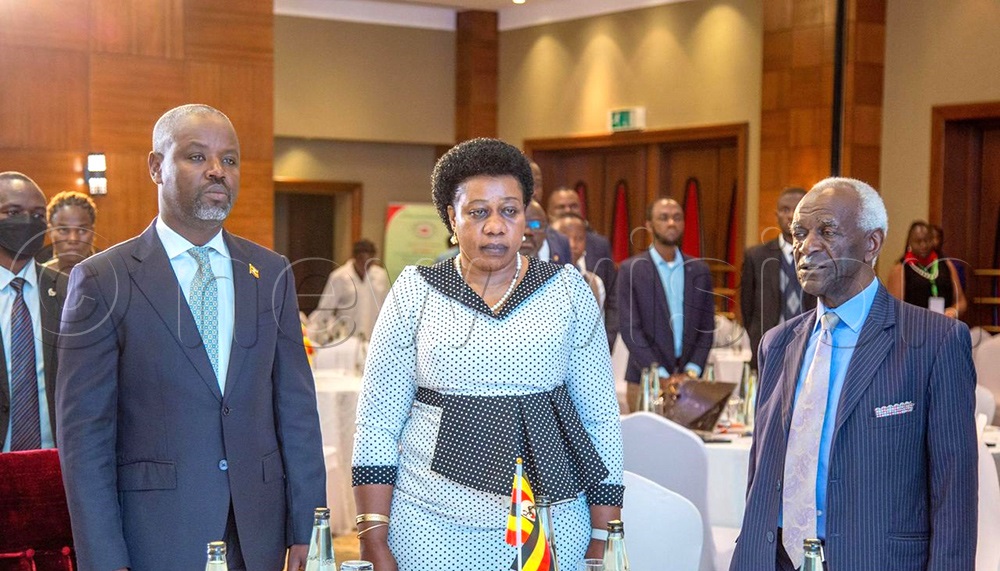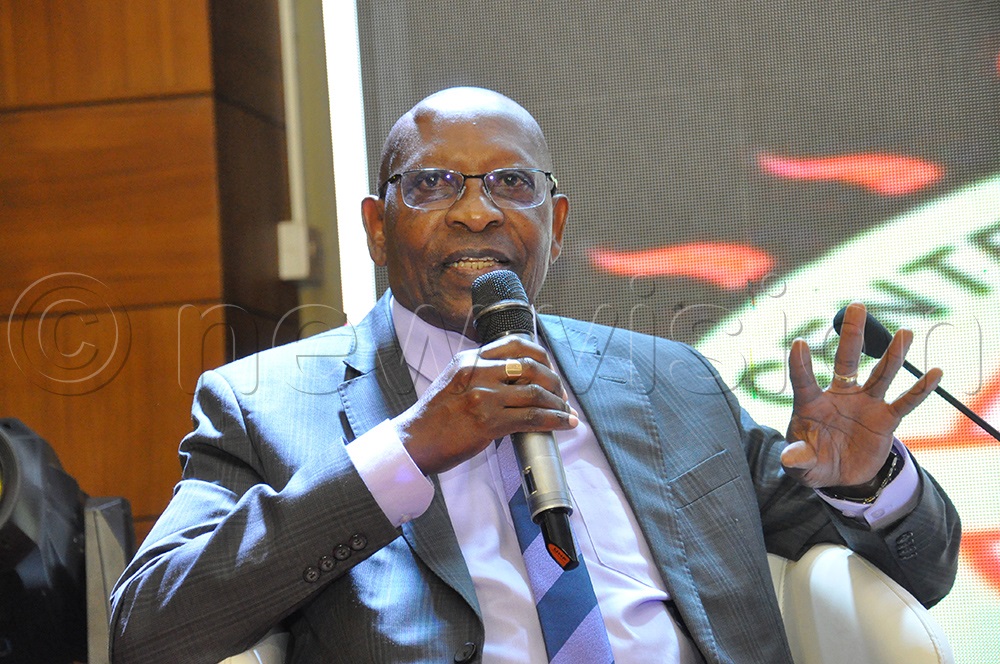Keep army out of electoral processes – South African Judge advises
Justice Kriegler, an internationally renowned jurist and former head of South Africa’s Independent Electoral Commission (IEC) during the landmark 1994 elections, was speaking at the 30th anniversary commemoration of Uganda’s 1995 Constitution held in Kampala.
John Kriegler addressing journalist during the 2nd National Uganda Constitution Conference at Sheraton Hotel on October 10, 2025. (Photo by Nancy Nanyonga)
_________________
A former South African Justice, Johann Kriegler, has urged Uganda to keep the army out of electoral processes and the judicial system, saying doing so would go a long way in promoting democracy and the rule of law.
Justice Kriegler, an internationally renowned jurist and former head of South Africa’s Independent Electoral Commission (IEC) during the landmark 1994 elections, was speaking at the 30th anniversary commemoration of Uganda’s 1995 Constitution held in Kampala.
(L-R) Professor Frederick Ssempebwa, former member of the 1995 Constitution Commission, James Ogoola former Principal Judge of the High Court of Uganda and Miria Matembe former Member of the Constituent Assembly. This was during the 2nd National Uganda Constitution Conference at Sheraton Hotel on October 10, 2025. (Photo by Nancy Nanyonga)
“Uganda should keep the armed forces out of electoral processes,” he said, emphasising that it is unacceptable for politics to influence the laws of the land.
While commending the government for showing greater tolerance toward opposition politicians, Kriegler warned that the handling of opposition figures remains a major concern.
Citing the case of Dr Kiiza Besigye, he urged authorities to act before matters spiral out of control. “The state is the ultimate exemplar of the rule of law; when it falls short, chaos looms large,” he said.
The conference, held on Friday at the Sheraton Hotel Kampala, was organised by the Centre for Constitutional Governance (CCG) and the Uganda National NGO Forum (UNNGOF). It attracted more than 100 delegates, including politicians, civil society actors, judicial officers, and legal experts from across the world.
Kriegler’s remarks echoed the concerns of several governance experts who have long called for reforms to safeguard Uganda’s democracy.
Dr Sarah Bireete, Executive Director of CCG and convener of the conference, said the national conversation series aimed to rekindle public interest in constitutionalism and assess the gains and shortcomings of the past three decades.

(L-R) Thomas Tayebwa Deputy Speaker of Parliament, Sarah Birete Executive Director Centre for Constitutional Governance and James Ogoola, Former Principal Judge of the High Court of Uganda during the 2nd National Uganda Constitution Conference at Sheraton Hotel on October 10, 2025. (Photo by Nancy Nanyonga)
“Today has been a reflection on the 30 years of the Constitution — what has worked and what has failed,” she said. “Many Ugandans understand the challenges: overreach of the executive, abuse of human rights, oppression of the opposition, land grabbing, excessive corruption, and a bloated government structure with over two million elected leaders supervising about 400 public servants nationally.”
Bireete also called for a comprehensive review of both the Constitution and the conduct of those entrusted with implementing it, particularly the presidency.
“We have had one permanent president for 40 years, larger and bigger than the Constitution, leading to an overreach that impedes its implementation,” she said. “We must work for a peaceful transition of power in this country.”
As Uganda gears up for another electoral cycle, discussions around constitutional reform and governance have gained renewed urgency.
Rt. Hon. Thomas Tayebwa, the Deputy Speaker of Parliament and chief guest at the conference, challenged Uganda’s elites to take a more active role in politics instead of merely criticising those in power.
“I have seen and heard people bash Parliament all the time, usually led by civil society and sometimes Sarah (Bireete),” Tayebwa said, drawing laughter from the audience. “When I stood for Parliament, my business colleagues discouraged me, saying I was doing well. But I told them Do you know the role of Parliament? They are the ones who determine the taxes I pay as a businessman.”
Tayebwa, who provided high-level political leadership and a parliamentary perspective on institutional strengthening, urged Uganda’s wealthy and influential citizens to emulate their American counterparts by engaging in active politics to safeguard their interests and contribute meaningfully to national development.
Other speakers included Prof. Frederick E. Ssempebwa, a former member of the 1995 Constitutional Commission; Justice James Ogoola, Principal Judge Emeritus of the High Court of Uganda; and Dr Miria Matembe, a member of the Constitutional Commission, Constituent Assembly Delegate (1994–1995), and Uganda’s first Minister of Ethics and Integrity (1998–2003).

Professor Frederick Ssempebwa, former member of the 1995 Constitution Commission addressing journalist during the 2nd National Uganda Constitution Conference at Sheraton Hotel on October 10, 2025. (Photo by Nancy Nanyonga)
Their discussions centred on key thematic areas such as institutional performance and independence — including the Judiciary, Parliament, and Electoral Commission and challenges of political capture and institutional integrity. Participants also reflected on the evolution of the Bill of Rights and comparative constitutionalism in Africa.
According to CCG, the conference sought to develop a policy and advocacy roadmap, strengthen the civil society voice, and increase public awareness of constitutionalism. It also aimed to foster stronger partnerships between civil society, government institutions, and international stakeholders to uphold the enduring spirit of Uganda’s 1995 Constitution.